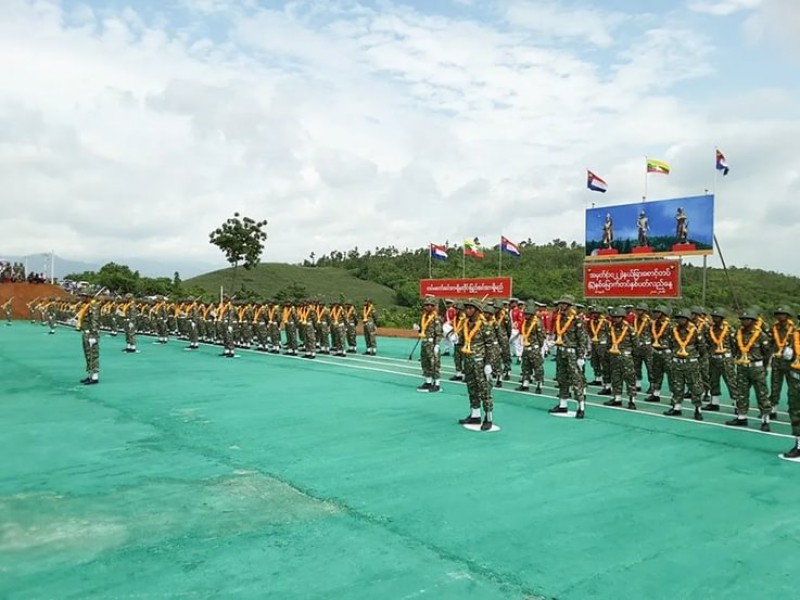Justice For Myanmar (JFM) called for sweeping sanctions against the leaders of the Karen Border Guard Force (BGF), which rules a swathe of territory on the frontier with Thailand.
“The Karen BGF is responsible for war crimes and transnational crimes, which it commits with total impunity,” JFM spokesperson Yadanar Maung said in a statement. “The illegal junta not only protects these criminal activities, but also profits from them as it continues to wage a war of terror against the people of Myanmar.”
Myanmar has been beset by armed conflict for decades, but descended into an all-out civil war after the military seized full control of the government in February, 2021. Several countries have since imposed sanctions on members of the ruling junta, as well as their supporters and state-backed corporate entities.
The military relies on militia forces like the Karen BGF for support in a war that researchers said killed at least 6,000 civilians in its first 20 months. The U.K. sanctioned two Karen BGF leaders, Saw Chit Thu and Saw Min Min Oo, last year for their “links to forced labour” at scam compounds.
Reporters were unable to contact the Karen BGF for comment.
In its report, JFM urged more countries to impose sanctions and the group mapped out the business interests of the Karen BGF leaders and associates, which include construction, mining and energy companies.
But the militia’s biggest profits may come from massive casino and scam compounds that are backed by Chinese organized crime groups, according to a report by the U.S. Institute for International Peace (USIP), a U.S. government-supported think tank.
Jason Tower, the Myanmar country director for USIP, said that “criminal enclaves under the BGF control account for approximately one quarter of the $15.3 billion stolen annually by Chinese-origin scam syndicates operating in Myanmar.”
“This means that annually, the compounds under the BGF control bring in $3.8 billion per year, and that the BGF may be receiving in excess of 700 million dollars in stolen funds each year,” he told OCCRP.
One of the most notorious compounds in the Karen BGF area is Yatai New City, in the town of Shwe Kokko, a purported $15-billion mega development site that actually serves as a front for cyber-scam centers and illegal casinos, JFM said.
The Yatai Group did not respond to JFM’s questions, but issued a statement last year calling such allegations “false and fabricated.”
The Yatai project was spearheaded by She Zhijiang, who also goes by Cambodian name Tang Kriang Kai and is in jail in Thailand awaiting extradition to China for allegedly running illegal online gambling operations in Southeast Asia. He also has links to a compound in Cambodia that is embroiled in human trafficking and cybercrime allegations, OCCRP previously reported.
Thousands of people have reportedly been trafficked to Yatai New City after being lured from their countries with promises of legitimate work. Upon arrival, they were imprisoned, beaten and made to take part in cyber scamming, while some female victims have been forced into sex work, JFM said.
The Yatai Group’s local subsidiary received a permit from the Myanmar Investment Commission in 2018 for a total investment of $22.5 million for the “construction, operation and leasing of high-end villas,” according to a corporate document retrieved by JFM before the junta restricted access to such records.
The application for the development permit was submitted by She Zhijiang, under his Cambodian name, and the Karen BGF colonel Saw Min Min Oo.



